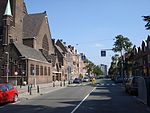Richard Visser
Businesspeople from RotterdamDutch chefsDutch people stubsFood biography stubsLiving people ... and 2 more
Pastry chefsYear of birth missing (living people)

Richard Visser (1968/1969) is a Dutch pastry chef who runs a pastry stand (Dutch: Richard Visser's Gebakkraam located on the corner of the Heemraadssingel and the Vierambachtsstraat in Rotterdam), which mainly sells oliebollen. In 2011 his oliebollen were named the best in the Netherlands by the Algemeen Dagblad national newspaper in their AD-Oliebollentest; this was his eighth win in nineteen years. He won again in 2013.
Excerpt from the Wikipedia article Richard Visser (License: CC BY-SA 3.0, Authors, Images).Richard Visser
Vierambachtsstraat, Rotterdam Delfshaven
Geographical coordinates (GPS) Address Nearby Places Show on map
Geographical coordinates (GPS)
| Latitude | Longitude |
|---|---|
| N 51.91744 ° | E 4.45435 ° |
Address
Richard Visser's gebakkraam
Vierambachtsstraat
3022 CG Rotterdam, Delfshaven
South Holland, Netherlands
Open on Google Maps









